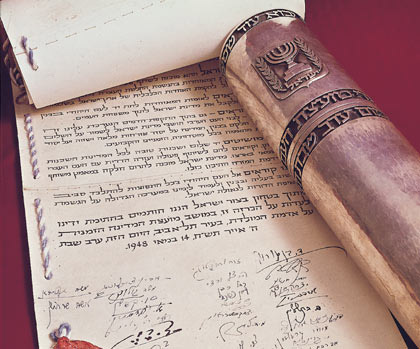STATE: The Law of the Land
-
-
GovXShortDescription
The prevailing characteristic of the Israeli legal system is the large corpus of independent statutory and case law which has been evolving since 1948.
-
-

 The State - Law
The State - Law
|
Israel's Declaration of Independence
GovXContentSection
Upon attaining independence (1948), Israel passed the Law and Administration Ordinance, stipulating that laws prevailing in the country prior to statehood would remain in force insofar as they did not contradict the principles embodied in the Proclamation of the Establishment of the State of Israel or would not conflict with laws to be enacted by the Knesset. Thus the legal system includes remnants of Ottoman law (in force until 1917), British Mandate laws, which incorporate a large body of English common law, elements of Jewish religious law, and some aspects of other systems.
However, the prevailing characteristic of the legal system is the large corpus of independent statutory and case law which has been evolving since 1948. Following the establishment of the state, the Knesset was empowered to enact a series of Basic Laws, relating to all aspects of life, which will eventually be brought together to form a constitution. Many Basic Laws have been passed, outlining the fundamental features of government such as the President, the Knesset, the Government, the Judiciary, the Israel Defense Forces, the State Comptroller, Freedom of Occupation and Human Dignity and Liberty (which addresses violation of a person’s life, body or dignity).
|
|
-
-
-
-
-
Basic Laws
-
GovXParagraph1
The normative superiority of Basic Laws over ordinary legislation was confirmed in 1995, when the Supreme Court assumed the power of judicial review of Knesset legislation violating a Basic Law.
Over the years, a body of case law has developed through Supreme Court rulings which protect civil liberties, including freedom of speech, freedom of assembly, freedom of religion, and equality as fundamental values of Israel's legal system.
In its capacity as the High Court of Justice, the Supreme Court also hears petitions brought by individuals appealing for redress against any government body or agent.
-
The Attorney-General
-
GovXParagraph2
The government's legal service is headed by the
attorney general, who holds exclusive power to represent the state in all major criminal, civil, and administrative matters. The government is bound to abstain from any action which, in the opinion of the attorney-general, is unlawful, as long as the courts do not rule otherwise.
Although appointed by the government, the attorney-general functions independently of the political system.
-
The State Comptroller
-
GovXParagraph3
The
State Comptroller's Office, established by law (1949) to assure public accountability, carries out external audit and reports on the legality, regularity, economy, efficiency, effectiveness and moral integrity of public administration.
Since 1971, the state comptroller also serves as ombudsman, receiving complaints from the public against state or public bodies subject to the comptroller's audit. The state comptroller is elected by the Knesset in a secret ballot for a seven-year term and is responsible only to the Knesset.
The scope of state audit includes the activities of all government ministries, state institutions, branches of the defense establishment, local authorities, government corporations, etc. In addition, the state comptroller is empowered by law to inspect the financial affairs of the political parties represented in the Knesset, as well as their election campaign accounts, imposing monetary sanctions when irregularities are found.
-
-
-
-
-
-
-
-
-